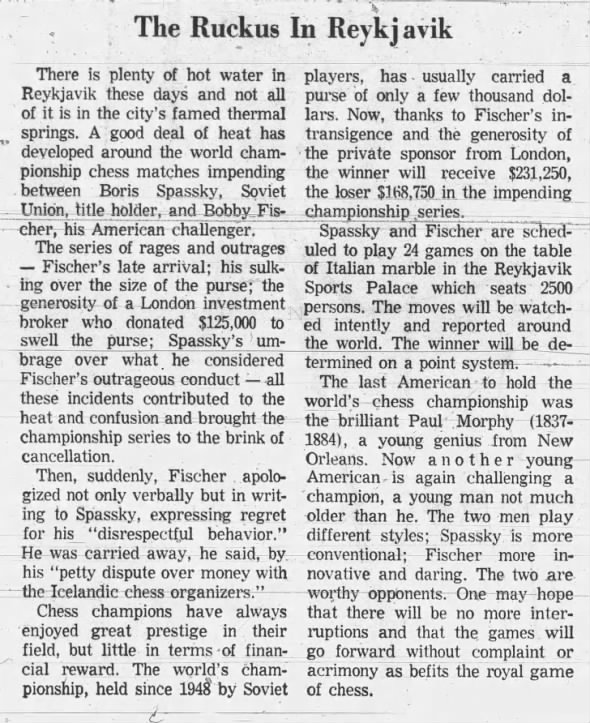The Morning Record Meriden, Connecticut Friday, July 07, 1972 - Page 6
The Ruckus in Reykjavik
There is plenty of hot water in Reykjavik these days and not all of it is in the city's famed thermal springs. A good deal of heat has developed around the world championship chess matches impending between Boris Spassky, Soviet Union, title holder, and Bobby Fischer, his American challenger.
The series of rages and outrages — Fischer's late arrival; his sulking over the size of the purse ([and justifiably so! considering Soviet tactics to cut the prize in half, by forcing Euwe to go back on his word to offer a “first come first serve” bid to other nations when Belgrade backed out, and Australia stepped up to the plate with a generous offer of $225,000 — with only 25k going toward organization expenses, with 200 grand in prize funds!]) the generosity of a London investment broker who donated $125,000 to swell the purse; Spassky's umbrage over what he considered Fischer's outrageous conduct ([Spassky was being used as a mouthpiece of the Soviet tyrants in Moscow. Either act the part of the puppet, or get “dragged on the carpet” along side Petrosian and Taimanov, which was inevitable, anyway]) — all of these incidents contributed to the heat and confusion and brought the championship series to the brink of cancellation.
Then, suddenly, Fischer apologized not only verbally but in writing to Spassky, expressing regret for his “disrespectful behavior.” He was carried away, he said, by his “petty dispute over money with the Icelandic chess organizers,” ([which would've never happened had Australia or Mexico been permitted to host the first half of the matches which came up for bid, as Euwe had given his word, “first come, first served” basis, until the Soviet Empire's intolerant regime snuffed out all outside competition with a demand to monopolize the entire match under Soviet control in racist and anti-American Iceland, which was necessary to achieve near-total censorship of the tournament, as possible. This was ultimately achieved by a “between the lines” contract with Chester Fox which forbid photography in the Sports Hall. Fischer did not order this unorthodox move, instead, Fischer was among the outraged that the Icelandic Chess Federation sold all photography rights (which every one agreed, including photographers and journalists from world media, abroad to be excessive, and an unusual action). Then, by employing noisy camera men, the Soviet was naturally depending upon Fischer to demand their removal from the hall. (See Fischer's interview, in his own words.) Thus, achieving the Soviet's goal of total black out of coverage, with their “Soviet Censorship Gambit”.])
Chess champions have always enjoyed great prestige in their field, but little in terms of financial reward. The world's championship, held since 1948 by Soviet players, has usually carried a purse of only a few thousand dollars. Now, thanks to Fischer's intransigence and the generosity of the private sponsor from London, the winner will receive $231,250, the loser $168,750 in the impending championship series.
Spassky and Fischer are scheduled to play 24 games on the table of Italian marble in the Reykjavik Sports Palace which seats 2500 persons. The moves will be watched intently and reported around the world. The winner will be determined on a point system.
The last American to hold the world's chess championship was the brilliant Paul Morphy (1837-1884), a young genius from New Orleans. Now another young American is again challenging a champion, a young man not much older than he. The two men play different styles; Spassky is more conventional; Fischer more innovative and daring. The two are worthy opponents. One may hope that there will be no more interruptions and that the games will go forward without complaint or acrimony as befits the royal game of chess.
 The Ruckus in Reykjavik 07 Jul 1972, Fri Record-Journal (Meriden, Connecticut) Newspapers.com
The Ruckus in Reykjavik 07 Jul 1972, Fri Record-Journal (Meriden, Connecticut) Newspapers.com























